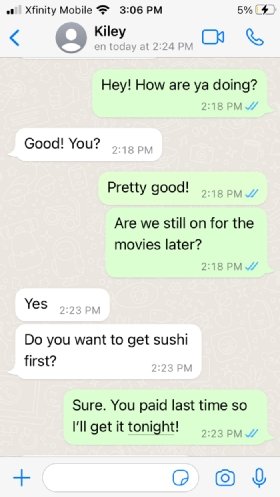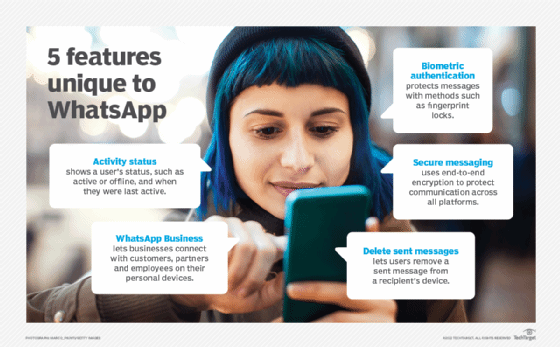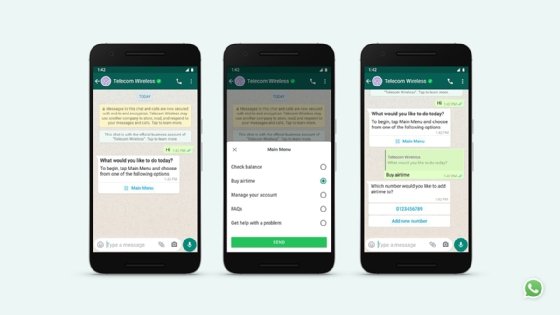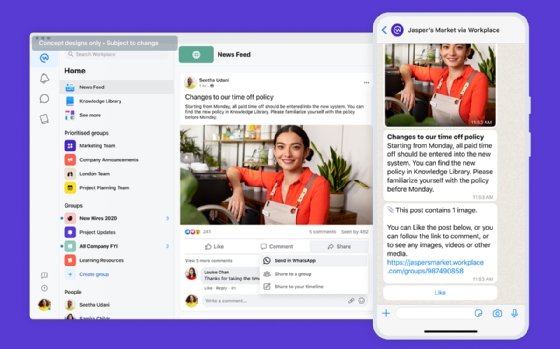What is WhatsApp?
WhatsApp is a free cross-platform messaging service. It lets users of iPhone and Android smartphones and Mac and Windows PC call and exchange text, photo, audio and video messages with others across the globe for free, regardless of the recipient's device. WhatsApp uses a Wi-Fi connection to communicate cross-platform, unlike Apple iMessage and Messages by Google, which require cellular networks and Short Message Service (SMS).
WhatsApp's use of Wi-Fi is cost-effective, making it popular with users who do not have data plans with unlimited calls and text messaging. Its cross-platform feature is also popular with people who have family abroad, travel internationally or live outside the United States.

How does WhatsApp work?
WhatsApp can be downloaded on any smartphone with a SIM card, internet connection and phone number. Once set up on a smartphone, a WhatsApp user can link their account to a desktop version of the app on a tablet or computer.
WhatsApp works like other Wi-Fi-exclusive messaging services, such as Facebook Messenger, which is accessible to both phones and computers. However, instead of requiring an account with a username and password, WhatsApp identifies users by their phone number. Anyone in the user's phone contact list already using WhatsApp is automatically added to the WhatsApp contact list, making it easy to find and message friends and family across platforms.
Key WhatsApp terminology
- Cross platform means communication is possible among different types of devices from various vendors, including iPhones, Android phones and desktop versions.
- End-to-end encryption ensures all exchanges are encrypted cross-platform.
- Messaging apps enable users to exchange messages over Wi-Fi or cellular networks.
- Video calls let users communicate using video, as well as voice and text.
- WhatsApp Business connects employers with customers and employees, letting businesses share information quickly and directly.
WhatsApp is free to download and use, but it is subject to roaming charges. If WhatsApp users travel outside the range of their network and use WhatsApp to communicate, they may incur data overage charges depending on their data plan.
If a user does not have an internet connection, they have the option to use cellular data to communicate instead. This can be toggled on or off in the app's Settings menu.
WhatsApp users can see how much data they are using in the Data and Storage Usage section in their WhatsApp Settings. WhatsApp automatically downloads all media received to a user's phone and stores it in the device's photo gallery. This can take up a lot of data.
If a user is concerned about data usage, they can toggle on the Low Data Usage setting or modify the download settings in Media Auto-Download to prevent the app from automatically downloading photos, videos and other documents when it has access to Wi-Fi. Users who change this setting can still view their media within WhatsApp itself.

WhatsApp key features
While many WhatsApp features are similar to messaging services like Apple iMessage and Messages by Google, its exclusive use of Wi-Fi lets it perform unique functions that cellular-data-network-driven applications cannot. These unique features include activity status, end-to-end encryption (E2EE) of cross-platform messages and the ability to delete sent messages.
These, along with WhatsApp's other key features, include the following:
Voice and video calls. Because WhatsApp uses Wi-Fi instead of cellular networks, cross-platform international calls are free. In addition to these standard video and voice calls, WhatsApp also includes free group calls, which let up to eight people attend one video call.
Voice messaging. WhatsApp was one of the first messenger apps to offer voice messaging, which is one of the most popular ways WhatsApp users communicate.
Activity status and read receipts. WhatsApp lets users share their activity status with contacts. Like Facebook Messenger, WhatsApp users can see when contacts are active on the app and typing a message. If a contact is offline, users can see when they were last active. WhatsApp also allows users to see when their message has been sent, delivered and read by the recipient. This last feature is known as read receipts. Users can turn off read receipts and disable or modify activity status.
Secure messaging. WhatsApp uses E2EE to protect user's communication. E2EE is a secure messaging method that prevents third parties -- such as internet service providers and hackers -- from accessing messages in transit from one device to another. It encrypts a sender's message in a way that only the recipient of the message can decrypt it. WhatsApp uses E2EE for cross-platform messaging, unlike iMessage and Messages by Google, which only encrypt communications within their platform. And while WhatsApp doesn't require a password to access the app, users have the option of setting up biometric authentication, like fingerprint locks, to protect chats.
Photos and video sharing. While virtually all messaging services allow photo and video sharing, WhatsApp's use of Wi-Fi let photos and videos keep their original resolution qualities across platforms, unlike most SMS messaging.
Document sharing. WhatsApp supports the sharing of various file types, including text documents, PDFs, slideshows, Hypertext Markup Language files and zip archives, up to 100 MB.
Desktop version. Like Apple iMessage, WhatsApp offers a downloadable desktop version of the app for Mac and Windows. WhatsApp's desktop app is different from Messages by Google's desktop version which can only be accessed in a web browser. This makes accessing messages easy if a user's phone isn't working or is unable to send and receive messages. However, the desktop version does not allow voice or video calling.
WhatsApp Business. WhatsApp Business is a version of the app tailored for businesses to communicate with customers and employees. It's particularly useful for small businesses that don't want to invest in a messaging platform. WhatsApp Business is an efficient way for businesses to connect with frontline workers and other groups that use their personal devices to communicate.

Real-time location tracking. Users can share their locations with contacts in real time, which comes in handy when users are trying to locate one another.
Delete sent messages. Unlike iMessage and Messages by Google, WhatsApp users can delete messages they sent. This lets users remove their sent message from a recipient's device and prevent future access to it. This is an especially useful feature if a user sends a message to the wrong person or has shared critical information with someone who should not have access to it.
Private reply. WhatsApp lets users reply privately to each other within group chats. This is handy if a user wants to respond to one person in a WhatsApp group chat without other members of the chat seeing it.

How secure is WhatsApp?
WhatsApp's use of E2EE messaging makes it a more secure option than unencrypted messaging apps like Facebook Messenger and Instagram direct messages. It also offers more security for cross-platform messaging. One pitfall of messaging apps like iMessage and Messages by Google is that while they offer E2EE, this feature is not supported when users message across platforms. For instance, when an Apple user messages an Android user, the message is sent as an SMS, which is not encrypted.
WhatsApp also offers encrypted backups of messages, which prevents third party entities -- including WhatsApp itself -- from accessing backups of messages stored in the cloud. Though this setting is turned off by default, users can turn on end-to-end encryption of WhatsApp chats in their settings.
Like other messaging services, WhatsApp is vulnerable to phishing security risks. WhatsApp users also face a unique threat: By default, WhatsApp downloads all media sent to a user's mobile device. With this setting turned on, malware-encrypted files can be sent to a WhatsApp account through spyware programs like Pegasus possible for the sender to hack the targeted mobile phone. Once hacked, Pegasus gains access to all data stored on a user's device and can even record conversations and take photos with the user's camera. In 2018, Crown Prince Mohammed bin Salman allegedly used this method to hack Amazon founder Jeff Bezos's phone, according to a statement by United Nations special rapporteurs David Kaye and Agnes Callamard.
WhatsApp cannot access the content of user messages, but it said it shares user metadata with its parent company, Meta -- formerly Facebook -- and other Meta companies. The metadata it shares includes users' phone numbers, profile photos, activity statuses, send dates of WhatsApp messages and IP addresses used. In some cases, Meta also provides user metadata to authorities serving warrants and subpoenas, and it has surveilled users at the direction of the U.S. Drug Enforcement Administration.
History of WhatsApp
Brian Acton and Jan Koum, both veterans of Yahoo, founded WhatsApp Inc. in early 2009. The name was designed to sound like the greeting "what's up?" combined with "app," shorthand for application. WhatsApp was not originally intended to be a messaging app but an app that would attach statuses to people in iPhone users' contact lists.
WhatsApp 2.0 launched later in 2009, when Apple launched push notifications, which let apps notify users even when they aren't actively using the app. With this capability, WhatsApp users could use the app to notify and message others. It also made WhatsApp one of the first messaging applications to use an internet connection instead of cellular networks for messaging and calling.
The app initially gained widespread adoption outside the U.S. As of 2020, WhatsApp said it had more than 2 billion users globally. It has retained standing as the leading messaging app favored by users outside China, according to GWI's 2022 Social report on social media trends.
In 2014, Facebook bought WhatsApp for $19 billion. The acquisition weakened WhatsApp's privacy rules and introduced new add-ons, such as WhatsApp business. In 2016, WhatsApp launched its video chat feature.
WhatsApp is a secure messaging service. Learn more about the ins and outs of instant messaging and mobile security.








